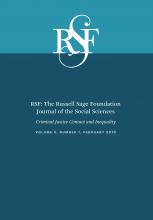Abstract
Contemporary American policing has routinized involuntary police contacts with young people through frequent, sometimes intrusive investigative stops. Personal experience with the police has the potential to corrode adolescents’ relationships with law and skew law-related behaviors. We use the Fragile Families and Child Wellbeing Study to estimate how adolescents’ experiences with the police shape their legal socialization. We find that both personal and vicarious police contact are associated with increased legal cynicism. Associations are present across racial groups and are not explained by teens’ behaviors, school settings, or family backgrounds. Legal cynicism is amplified in teens reporting intrusive contact but diminished among teens reporting experiences characterized by procedural justice. Our findings suggest that aggressive policing risks weakening teens’ deference to law and legal authorities.
- © 2019 Russell Sage Foundation. Geller, Amanda, and Jeffrey Fagan. 2019. “Police Contact and the Legal Socialization of Urban Teens.” RSF: The Russell Sage Foundation Journal of the Social Sciences 5(1): 26–49. DOI: 10.7758/RSF.2019.5.1.02. The Fragile Families and Child Wellbeing Study was funded by the Eunice Kennedy Shriver National Institute of Child Health and Human Development (NICHD) of the National Institutes of Health under award number R01HD36916, R01HD39135, and R01HD40421, as well as a consortium of private foundations. The content is solely the responsibility of the authors and does not necessarily represent the official views of the National Institutes of Health. The authors are grateful for feedback from participants at the Russell Sage Foundation authors’ conference and from anonymous reviewers. Direct correspondence to: Amanda Geller at amanda.geller{at}nyu.edu, Department of Sociology, New York University, 295 Lafayette St., New York, NY 10012.
Open Access Policy: RSF: The Russell Sage Foundation Journal of the Social Sciences is an open access journal. This article is published under a Creative Commons Attribution-NonCommercial-NoDerivs 3.0 Unported License.










